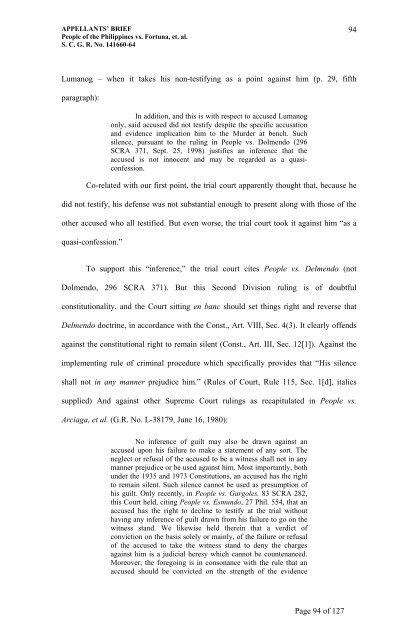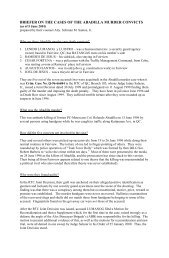Republic of the Philippines - Campaign
Republic of the Philippines - Campaign
Republic of the Philippines - Campaign
Create successful ePaper yourself
Turn your PDF publications into a flip-book with our unique Google optimized e-Paper software.
APPELLANTS’ BRIEF<br />
People <strong>of</strong> <strong>the</strong> <strong>Philippines</strong> vs. Fortuna, et. al.<br />
S. C. G. R. No. 141660-64<br />
Lumanog – when it takes his non-testifying as a point against him (p. 29, fifth<br />
paragraph):<br />
In addition, and this is with respect to accused Lumanog<br />
only, said accused did not testify despite <strong>the</strong> specific accusation<br />
and evidence implication him to <strong>the</strong> Murder at bench. Such<br />
silence, pursuant to <strong>the</strong> ruling in People vs. Dolmendo (296<br />
SCRA 371, Sept. 25, 1998) justifies an inference that <strong>the</strong><br />
accused is not innocent and may be regarded as a quasiconfession.<br />
Co-related with our first point, <strong>the</strong> trial court apparently thought that, because he<br />
did not testify, his defense was not substantial enough to present along with those <strong>of</strong> <strong>the</strong><br />
o<strong>the</strong>r accused who all testified. But even worse, <strong>the</strong> trial court took it against him “as a<br />
quasi-confession.”<br />
To support this “inference,” <strong>the</strong> trial court cites People vs. Delmendo (not<br />
Dolmendo, 296 SCRA 371). But this Second Division ruling is <strong>of</strong> doubtful<br />
constitutionality, and <strong>the</strong> Court sitting en banc should set things right and reverse that<br />
Delmendo doctrine, in accordance with <strong>the</strong> Const., Art. VIII, Sec. 4(3). It clearly <strong>of</strong>fends<br />
against <strong>the</strong> constitutional right to remain silent (Const., Art. III, Sec. 12[1]). Against <strong>the</strong><br />
implementing rule <strong>of</strong> criminal procedure which specifically provides that “His silence<br />
shall not in any manner prejudice him.” (Rules <strong>of</strong> Court, Rule 115, Sec. 1[d], italics<br />
supplied) And against o<strong>the</strong>r Supreme Court rulings as recapitulated in People vs.<br />
Arciaga, et al. (G.R. No. L-38179, June 16, 1980):<br />
No inference <strong>of</strong> guilt may also be drawn against an<br />
accused upon his failure to make a statement <strong>of</strong> any sort. The<br />
neglect or refusal <strong>of</strong> <strong>the</strong> accused to be a witness shall not in any<br />
manner prejudice or be used against him. Most importantly, both<br />
under <strong>the</strong> 1935 and 1973 Constitutions, an accused has <strong>the</strong> right<br />
to remain silent. Such silence cannot be used as presumption <strong>of</strong><br />
his guilt. Only recently, in People vs. Gargoles, 83 SCRA 282,<br />
this Court held, citing People vs. Esmundo, 27 Phil. 554, that an<br />
accused has <strong>the</strong> right to decline to testify at <strong>the</strong> trial without<br />
having any inference <strong>of</strong> guilt drawn from his failure to go on <strong>the</strong><br />
witness stand. We likewise held <strong>the</strong>rein that a verdict <strong>of</strong><br />
conviction on <strong>the</strong> basis solely or mainly, <strong>of</strong> <strong>the</strong> failure or refusal<br />
<strong>of</strong> <strong>the</strong> accused to take <strong>the</strong> witness stand to deny <strong>the</strong> charges<br />
against him is a judicial heresy which cannot be countenanced.<br />
Moreover, <strong>the</strong> foregoing is in consonance with <strong>the</strong> rule that an<br />
accused should be convicted on <strong>the</strong> strength <strong>of</strong> <strong>the</strong> evidence<br />
Page 94 <strong>of</strong> 127<br />
94




